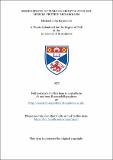Files in this item
Some effects of tumour growth upon rat muscle protein metabolism
Item metadata
| dc.contributor.advisor | Goodlad, G. A. J. | |
| dc.contributor.author | Raymond, Michael John | |
| dc.coverage.spatial | 195 p. | en_US |
| dc.date.accessioned | 2018-06-25T10:35:55Z | |
| dc.date.available | 2018-06-25T10:35:55Z | |
| dc.date.issued | 1972 | |
| dc.identifier.uri | https://hdl.handle.net/10023/14527 | |
| dc.description.abstract | The effect of the growth of the Walker 256 carcinoma upon various aspects of rat diaphragm protein metabolism was investigated. Microscopic examination of diaphragm muscle from tumour-bearing rats revealed that the mean muscle fibre diameter was reduced compared with the normal animal. The extracellular space of both 'cut' and 'intact' diaphragm preparations was measured, using sorbitol and inulin as extracellular markers. No differences were observed in the extracellular space of both types of diaphragm preparation from normal and tumour-bearing rats, using sorbitol as the marker. With inulin as marker, the extracellular space was much smaller in the 'cut' diaphragm preparation from the tumour-bearing animal. Quantitative analysis of diaphragm muscle showed that the muscle lost weight during the growth of the tumour and that part of the weight loss was due to the loss of protein. Further, the loss of contractile proteins appeared to be more extensive than the loss of sarcoplasmic proteins. The in vitro incorporation of H-lysine into mixed proteins of rat diaphragm was shown to be greatly reduced by the growth of the tumour. This effect seemed to be directed principally at the myofibrillar proteins. The inhibition was not alleviated by the addition of either high concentrations of lysine or a mixture of amino-acids to the incubation medium. Normal diaphragm muscles incubated in serum from a tumour-bearing rat exhibited a greatly decreased up-take of labelled lysine into the myofibrillar proteins, and this pattern was not altered by supplementation of the medium with a mixture of amino-acids. The stimulatory effect of insulin upon muscle protein synthesis was greatly reduced by the growth of the tumour. In the normal animals studied, the effect of insulin seemed to be directed principally towards the myofibrillar proteins. A toxohormone fraction was prepared from Walker tumour tissue by an acetic acid extraction method, and purified by cation-exchange chromatography and gel-filtration. The biological activity of the preparation was assayed by measurement of its effect upon the plasma iron level in mice. The effect of the purified toxohormone fraction upon muscle protein synthesis was investigated both in vivo and in vitro, and the toxohormone was observed to exert a profound inhibitory effect upon the incorporation of labelled lysine into mixed intracellular muscle proteins. | en_US |
| dc.language.iso | en | en_US |
| dc.publisher | University of St Andrews | |
| dc.subject.lcc | QP551.R2 | |
| dc.subject.lcsh | General works, treatises, and textbooks | en |
| dc.title | Some effects of tumour growth upon rat muscle protein metabolism | en_US |
| dc.type | Thesis | en_US |
| dc.type.qualificationlevel | Doctoral | en_US |
| dc.type.qualificationname | PhD Doctor of Philosophy | en_US |
| dc.publisher.institution | The University of St Andrews | en_US |
This item appears in the following Collection(s)
Items in the St Andrews Research Repository are protected by copyright, with all rights reserved, unless otherwise indicated.

